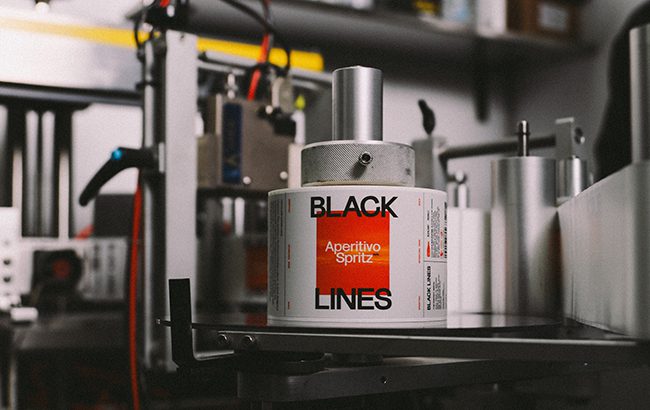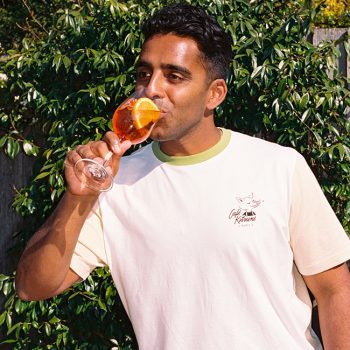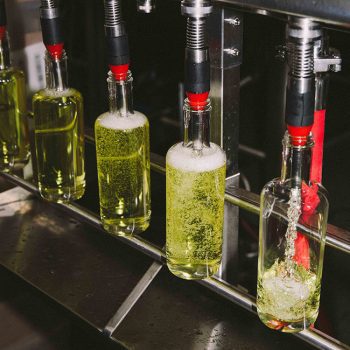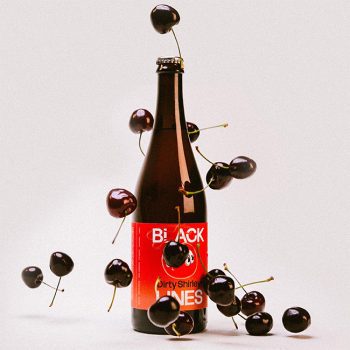How Black Lines is shaking up the ready-to-serve market
By Lauren BowesWhat began as just two cocktails on tap has grown into a full portfolio of nine draught lines and 11 bottled serves – but Black Lines is just getting started.

Black Lines’ origins trace back to the mid-2010s, when co-founder Casey Sorenson was group bar manager at Soho House. While the private members’ club prides itself on its exclusivity, its cocktails have achieved cult status – with bestsellers like the Picante de la Casa flowing by the litre every weekend.
The popularity was great for business but challenging for the bar team. Sorenson was tasked with refining Soho House’s pre-batched programme, which began with mixing syrups and juices ahead of service, then adding spirits and soda to order. Over five years, he transformed the system, batching cocktails into Cornelius kegs so they could be carbonated and poured directly from the tap.

“It was pretty forward-thinking at the time,” says fellow co-founder Kuleen Khimasia. “It was a really great offer, with the speed of service and the efficiency, but it was difficult to get consistency in that environment. That’s where Casey got the idea for Black Lines.”
Leaving Soho House behind, Sorenson’s plan was to visit the best distilleries, wineries and breweries to gather learnings. “He wanted to take that approach into cocktails and deliver what they were doing behind the bar at Soho House, but at scale for venues that didn’t have that expertise,” says Khimasia.
A year later, Khimasia reached out to Sorenson for a bar solution for his street food pop-up. “We met for a coffee in January 2018 and by March we had become business partners,” he says.
Hitting the bottles
While draught cocktails were the brand’s foundation, bottles were always part of the plan. The first trials happened quietly at the Standard hotel, which served the bottles alongside garnishes in ice buckets with guests to self-pour.
Then, in March 2020, the pair realised their main income stream was about to dry up overnight. “We were about five months into our first trial, and thankfully we had three bottles ready. We launched the website within two weeks after Covid hit,” Khimasia explains.
Prior to the pandemic, bottled cocktails were something of an unknown for the general public. “But suddenly, Covid created this space. People understood it – their favourite bars were making bottled cocktails, and they could have these things at home. It wasn’t a weird or unexplainable format,” he says.
With its partner venues closed, Black Lines spent nearly a full year focusing on bottles, launching six or seven products in 2020 alone. “We came out of Covid with a much more mature range of formats,” he says.
The seemingly obvious next step for the brand is to enter the burgeoning canned cocktail market, but Khimasia doesn’t see it happening soon. “It’s a really interesting space, and we’re not blinkered to the format,” he says. “There are useful cases for cans that we haven’t approached before – focused on convenience and festival environments.
“If we were to enter it, it has to be something we really believe in – not just another product in the wash of everything else.”

Quality, consistency and sustainability
Consistency and sustainability are at the forefront of the brand’s mission. Sorenson’s meticulous approach – or “incredible neuroticism”, as Khimasia describes it – ensures every keg tastes identical, while partnerships with sustainable brands like Two Drifters and Sapling allow Black Lines to operate with an eco-conscious footprint.
While each partnership is carefully thought through, the co-founders aren’t afraid to make a change as the business evolves – as demonstrated by their decision to stop using Aperol last year.
“We had a lovely relationship with Aperol for six or seven years,” Khimasia explains. “It’s really important to us to work with partners that allow us to be sustainable and have sustainable values. And that’s not to say that Aperol doesn’t – but it just couldn’t support the style of product we’re making.”
Aperol’s inability to provide its liquid in bulk was a bugbear for Black Lines. After much deliberation, Khimasia discovered Gamondi, a different aperitivo brand that does supply in bulk – saving 20,000 glass bottles from production runs every year. “We wanted to find a product that suited our needs when it came to sustainability and still delivered an amazing product,” he says. “Quality is paramount, but sustainability goes hand in hand with that.”
Design has also been part of the brand’s DNA since day one – so much so that their first hire was a designer rather than a salesperson. Paying an agency to create its branding could have meant sticking with the same designs for years, but having an in-house designer – who has stuck around from the beginning – means Black Lines can remain agile.
“We wanted to create a brand that told our story before we even arrived on the counter,” Khimasia explains. “We want to test ourselves to make the best-looking drinks products in the market.”

The drinks
The Black Lines portfolio continues to grow. The Spicy Tommy’s Margarita remains the bestseller across draught and bottled formats, followed closely by the Aperitivo Spritz and Hugo Spritz. Khimasia believes the Tequila boom has supported the Margarita’s success, with the brand planning to relaunch its Paloma imminently to make the most of the wave.
The brand’s most recent launch, the Dirty Shirley, exemplifies the brand’s playful yet sophisticated approach. The brand launched its non-alcoholic Shirley Temple two-and-a-half years ago during Dry January, and it’s remained steadfast since. It was so loved by the Black Lines team that they often found themselves spiking it with vodka or gin.
“We’re really proud of the Dirty Shirley,” says Khimasia. “It’s not stuffy or complicated. We’ve taken the original mocktail and delivered an adult feel to it, while it still has that playful soul of the original.”
As for the future, Khimasia says the focus is on “delivering the best cocktails we can, in formats that are exciting and can reach new spaces and new people”.
Nearly a decade in, he still feels like Black Lines is just getting started. “It’s quite scary to think we’re almost 10 years old – but it also feels like we’ve been doing it for a month. There’s always more to do, and we’re only scratching the surface of what we can deliver.”
Related news
Surfside: 'We want to be the Coca-Cola' of RTDs
